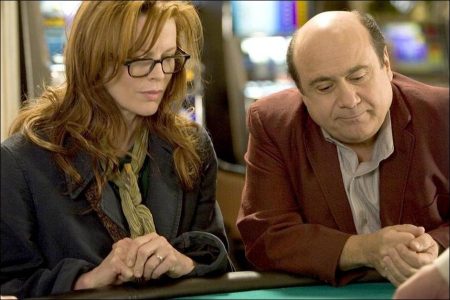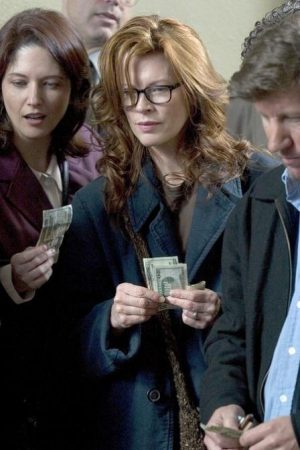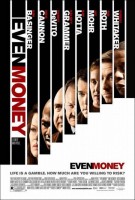Tagline: Life is a gamble. How much are you willing to risk?
In Even Money there are no safe places, no one is left untouched – gamblers are mothers, brothers, dreamers and lovers. As the narrative unravels, we come to understand that addiction has no loyalty to race, age or life circumstances. Addiction is random, wreaking havoc on those individuals who are drawn into its seductive world of quick fixes and escapism, to those unsuspecting souls who are caught in its devastating wake.
Under a moonless night, a body washes up on the shore. Across town, a desperate woman searches for a lucky one-armed bandit that will let her win back her and her husband’s life savings, while her unsuspecting family prepares dinner. In the urban sprawl, a janitor’s debts spiral out of control forcing him to ask his younger brother to risk his future by shaving points on a game.
A woman falls in love with a man who uses violence to ensure that debts are paid on time. Even Money is a provocative journey through a cross-section of American society where addiction takes hold and becomes an insatiable hunger.
Director Mark Rydell explores the emotionally charged world of addiction and how the ripple effect of seemingly unrelated events can cause a chain reaction that shatters dreams and tests the boundaries of love and forgiveness. Even Money stars Kim Basinger, Nick Cannon, Danny DeVito, Kelsey Grammer, Carla Gugino, Ray Liotta, Jay Mohr, Tim Roth, Grant Sullivan, and Forest Whitaker.
The Genesis of Even Money
Carolyn Carver (Kim Basinger) is a writer with a gambling addiction that threatens to destroy her marriage and family. She meets a washed-up magician (Danny DeVito) who promises that he can help. Meanwhile, Godfrey Snow (Nick Cannon) is a star college basketball player who shaves points to help his brother, Clyde (Forrest Whittaker), get even. A small-time bookie (Grant Kramer) tries to win over the love his life, Veronica (Carla Gugino). Victor (Tim Roth), a sadistic criminal, attempts to control an uncontrollable world. All the while Detective Brunner (Kelsey Grammar) follows the trail of a mysterious death.
For writer Robert Tannen, the screenplay for Even Money was inspired by his own personal brush with gambling and its aftermath of despair. “The idea for a script about gambling had been swimming around in my head for awhile. When I was younger I used to caddy and a lot of us would go to the horse track after we did our morning loop. I was 18 or 19 years old, and the first day I went to the track and laid a bet, I won $300 so I was hooked. But then I started looking around and saw all these desperate people whose lives had crumbled apart. I saw some of my friends go down because of addiction, and lose all their money. I was fortunate enough for some reason to be able to get out of it.”
Provoked by a lack of realistic media attention on what Tannen saw as an insidious element in America’s social fabric, he decided that gambling deserved a more accurate exploration than the previous exposés where gamblers were marginalized as Atlantic City-style degenerates. “I didn’t see the reality of gambling reflected in the media. Gambling is everywhere. There are millions and millions of people playing the lottery once a week, there’s sports betting which is huge, and now you can play blackjack over the Internet. I just found it fascinating, sort of a metaphor of the American Dream, where everyone has these dreams, they want it all, and they’ll bet everything to get there.”
According to statistics, pathological gambling in the U.S. is a problem that affects many adults. Even more rampant are those that have less significant but still serious problems with gambling and are known as problem gamblers. Problem gambling has been called the “hidden addiction” as there are often few outward warning signs until it is too late.
“It’s an incredibly cinematic personality trait,” says producer David Greathouse. “You can watch these people destroy their lives or increase it tenfold. It’s like a train wreck or a pile-up on the freeway; everybody wants to stop and take a look because it’s something terrible, but it’s not happening to them.”
Addiction and gambling is a storyline that has often been revisited in films. But for Greathouse he found Even Money presented a new perspective grounded in the concept that these are normal people living normal lives, but have somehow slipped off the right path. Perhaps it’s this normality that is so disarming. Even Money examines a glimpse of everyday life and the choices we all make.
According to Rydell, these interconnected stories are a snapshot of the human condition. “A director spends most of his time reading material. When I read Even Money, I felt there was such a profound understanding of human character and of the stress that a gambling addiction puts upon people, it captured my imagination and I thought ‘My God, this is wonderful!’ Robert wrote something truly beautiful.”
Even though the film delves into a dark and disturbing world, Danny DeVito believes the script also delivers a message of compassion and optimism. “All these lives of people who are trying to find their way, trying to make ends meet is very compelling,” he says. “Some of these people are bad, some are good. Some people are misguided and some are lost. It’s the struggle to find a shining light . trying to stay positive in the face of difficulty is a valuable trait.”
Co-star Jay Mohr, who plays Augie, a bookie that might find that getting out of the business may cost him his life, believes that the themes and observations that Even Money explores are universal. “One of the great strengths of this script and what makes it unique is that Robert Tannen hasn’t stereotyped addicts or addiction. Kim’s character is a mom, Forest Whitaker is a janitor, Nick’s a basketball star, I’m a middle-class bookie, Tim’s a millionaire bookie. So many different levels of society are reflected, and the audience is going to be familiar with some of these characters just by virtue of how typical they are.”
“The stakes for all the characters are extremely high. There’s nothing casual about this movie,” says Carla Gugino, who portrays Veronica, a woman in love with a bookie. “When I read the script, what I found so intriguing was not only structurally how the story comes together at the end, but also that these people are dealing with the complexities of real life. Nothing is black and white. Depending on which perspective you’re coming from, the stories and characters take on different meanings. I think there’s always a struggle between how you see your life, how you want to see your life, who you want to be and where your heart is leading you. Sometimes that’s very hard to figure out.”
For actor Nick Cannon, whose character Godfrey Snow is a young basketball player with a shot at the NBA, the power of Even Money is that it voices the trials and tribulations of more than one generation.
“This is a breakout role for me because this was not your typical coming-of-age story. This is more raw and gritty,” says Cannon. “The script had real dialogue between real people in real situations without all the glitz and glamour around it. Sports is a serious thing to people my age, whether it’s being part of the game and seeing it as a way out or as something entertaining where you put a little money on a game. You hear about it all the time on television about players shaving points. It’s not just older people who have lost their dreams, it could be younger people still striving for their dreams that get wrapped up in a situation.”
Getting Even Money Made
For producer David Greathouse, Even Money was one those times when serendipity intervened and a dream project fell into his lap. “An agent I knew called me to tell me about this guy in his writer’s group who just moved out from New York and had written a script. I read it and thought it was genius,” he says. At this point I hadn’t found a director but then I met Mark Rydell and knew he was the right person. We started collectively putting the cast together and met with Bob Yari who loved the script and the actors we began assembling, and decided to take a chance on it.”
As all filmmakers know, the greatest force in getting a film made is having a champion, someone whose passion for the project takes a force of its own.
“This movie was made because of Danny DeVito,” Greathouse says bluntly. “He was so helpful in the beginning, so passionate about it, and every time there was a bump in the road, Dan was there asking, ‘What do you need me to do? Who can I call?’ He was such a fanatic for the film. His wave of enthusiasm and desire to make this film to happen helped us in getting the script to other actors like Kim Basinger.”
“If you have a desire to make movies, you look for good stories, and that’s what I do,” says DeVito. “When I find something that I get fired up about like this movie, there’s the opportunity to have a great cast like we do, then you go wholeheartedly out to try to put that on the screen.
In this case Bob Yari is the angel of this movie, and whether it’s a studio or independent film, you need somebody who believes in it. If you find someone that’s willing to put their money up for a picture, then I think if you really care, you do everything you can to get it made. I thought this was a very well-written and compelling script. Plus, I really wanted to work with Mark Rydell.”
Rydell notes the new trend of making movies outside the studio system. “Studios are less interested in personal stories. As a result the independent world has become alive with pictures of personal interest, about human drama. Fortunately for us, Bob Yari had the wisdom of seeing the virtue in this material. We didn’t have a big studio budget, but when you’re limited you have to be inventive and we have been.”
Another person immediately attracted to Even Money was Tim Roth, who portrays Victor, a very influential criminal who doesn’t like competition and who is in the throws of expanding his territory. “It was tight and a complete script, which is quite rare. It had all four stories kind of overlapping and I thought it was a good piece of thriller writing” says Roth. “The independent film world is where the good scripts exist for actors. There are maybe four films a year that come out of the studios where the scripts are knockouts, so most actors don’t stand a chance of getting a look at those scripts.”
The Casting of Even Money
Greathouse quickly acknowledged the script was the ingredient that attracted this stellar cast like bees to honey. “Putting together an ensemble cast is not easy. The strength of the script is what gave everyone the comfort level they needed. All the actors knew we had a very small budget, much, much smaller than what they were used to, but they responded to the material. Rydell is a director who really has the sensibility of how to stage a shot and keep the energy level where it needs to be so that the actors and crew stay engaged. I think one of the aspects of the script that was so compelling was how three or four different stories were seemingly unconnected and that everyday life all came down to whether or not this one kid makes a EVEN MONEY.”
“I’m executive director and artistic director of the Actor’s Studio West Coast, so I’ve worked with a lot of actors and I know what attracts them,” explains Rydell. “This script has the kinds of parts actors cannot resist. You can go to very successful and skillful actors knowing they’ll be interested. Everybody wanted to be in this picture; it was very flattering.”
Of his cast Rydell says, “Kim is an actress of enormous talent, and she can get in touch with a certain kind of desperation that was so germane to her role. Danny DeVito will take your breath away and break your heart in the role of Walter, a down-and-out magician who’s scuffing around the bottom of the barrel. Ray Liotta wanted very much to play a grown-up father, not a criminal, a decent man who loves his family and is struggling with a real problem.
Forest Whitaker ate this stuff up alive. Nick Cannon, who has such popularity as a hip-hop artist, is just brilliant in his role as Forest’s younger brother. I get to introduce to audiences a gifted young actor, Grant Sullivan, who I found in on Melrose Avenue in a play he wrote and starred in. He’s a very tough guy, but extremely sensitive and compelling. Kelsey Grammer is a real actor, you know, not just a TV star. He’s very committed and he changed his appearance dramatically for this role so that he could just disappear in it.
Tim Roth is one of the best actors I know and plays one of the most curious kinds of characters, a top-level bookie. Tim is so inventive and I’m sure audiences will love to see him play Victor with a maliciousness that’s delicious. Jay Mohr has this amazing energy and is perfect as Augie, the best friend and partner to Grant Sullivan’s character. This is a dream cast for any director.”
For Kim Basinger, playing the role of Carolyn Carver was too irresistible to pass up. “This was such a huge opportunity and challenge for me,” says the Oscar-winning actor. “A real chance to drop all those things that I know so well, that I’m comfortable with in my own life. I had to mow down everything to go into this movie. I couldn’t use anything, and that’s what I loved.”
She adds, “A huge factor that led me to this role was from an aesthetic point of seeing me with Danny DeVito, since it’s an odd coupling. He’s so endearing and so magical as Walter, he owns this role. I don’t see anybody else as Walter, it had to be him and it worked. And the two of us together worked.”
Greathouse said he was struck at their first meeting by how much Basinger had already invested into the role. “Mark and I met Kim for lunch and she knew precisely what she wanted out of the role. She had already figured out how to play Carolyn.”
For Tannen, the role of Walter, a washed-up magician who goes by The Amazing Abraham, was especially poignant because it paid homage to his grandfather and the host of characters that dropped by the famous Tannen’s Magic Shop in mid-town Manhattan. “At this point in his life Walter is working in a casino doing tricks, trying to get by. My grandfather was a magician, and we knew all of these old magicians who were just scraping by but were really geniuses with their magic. I grew up watching these guys, hearing their stories. But you know you’re never going to make money with magic unless you’re David Copperfield or making tigers disappear.”
“This is definitely a role reversal where I’m holding the family together,” said Ray Liotta, who plays opposite Basinger in the role of Tom Carver, her loving husband. “A lot of the characters I’ve played in the past, usually I’m the one who’s the aggressor.” he said.
For Basinger, having Liotta cast as the dedicated husband and father gave her a unique freedom to tackle her character head-on. “I think it helped me tremendously with the character, not having to carry that responsibility of being the mom who holds things together, having my husband as the one who is the hero.”
Emotionally drawn to the role of Clyde Snow, Forest Whitaker was moved by the storyline where the love between two brothers was put to the ultimate test. “I thought the character was fascinating in the sense that he really loves his brother so deeply but he has this addiction…and more than anything, it’s really an addiction to dreams. That something magical is going to happen and life will fall his way. That’s the game he plays with his brother all the time. Nick and I started to feel each other’s energy and started to bond like brothers very early on and for me that was critical, that you get to feel that connection between us. “
Grant Sullivan says Even Money was the opportunity of a lifetime. “Until this project, I had only acted on stage, so I didn’t really know what to expect or how different the experience would be, but Mark Rydell really took me under his wing. It has been an amazing journey and I’ve loved every minute.”
For Nick Cannon, who had been looking to do an independent film, Even Money was the perfect launching pad for tackling more complex material and characters. “This was a unique script because of how it approached gambling and addiction,” says Cannon. “ When I read the script, the rest of the cast was attached already and Mark Rydell was directing so it was a real prestigious project. I read the role of Godfrey and felt I could relate to him as someone who had a lot of aspirations at a young age.”
The Characters
“When I was writing Even Money,” says Robert Tannen, “what was important to me was that these were real people. They’re not caricatures of bad gamblers or the typical Vegas stereotypes that everyone is used to.” In all the interconnected stories and lives of individuals, says Tannen, there is an innate sense of desperation and loneliness that comes with addiction, of lives spiraling out of control.
For Kim Basinger, Carolyn Carver is a woman struggling with insurmountable demons. Part of the appeal of playing Carolyn was being able to confront a false sense that all is perfect behind the white picket fence. Carolyn is beautiful, intelligent, a published writer, she has a dedicated and loving husband and a beautiful teenage daughter. Carolyn by all appearances has it all . but for Carolyn that’s the problem.
“I think Carolyn dabbled in gambling as a release and escape from her pain and insecurity,” says Basinger. “She has a tremendous amount of self-doubt, self-loathing and fear. Carolyn doesn’t think she’s good enough, she doesn’t deserve this blessed life she has. She has this beautiful man who is so dedicated to her and their daughter. But that’s too perfect. Life is perfect, but that’s just the opposite of the way she feels. So she has to shatter it as if it’s an illusion.”
Basinger found delving into Carolyn’s world an unnerving experience where for a brief moment, life imitated art. “We shot this movie so quickly that I got caught up in Carolyn’s world and it scared me,” said Basinger. “With this character I could feel how she started loving the high that gambling gave her and could feel this addiction growing inside of her to the point where nothing else mattered. Nothing took top place but the addiction. Daughter, husband, nothing! Everyday around the casino tables I could feel it and I think that’s what Mark tried to get me to do. He wanted to see my anxiety and fear.”
Danny DeVito portrays the washed-up magician who befriends Carolyn. “Walter’s a guy who was a magician when he was a young man, but now he works the casino doing tricks, close-hand magic stuff, making a few tips, basically a hustler in terms of trying to make ends meet,” says DeVito. “He’s a good guy, just hasn’t had a lot of breaks and he would like to be a magician again, get back on the circuit if he could. He has no family, he’s kind of on his own . it’s not a very romantic life but it’s okay, there’s a lot of people around to talk to.”
Then one day, Walter spots Carolyn, which sets in motion a sequence of events that no one could foresee. “Carolyn is kind of a shining light in this sea of depression,” DeVito says. “She’s an odd person to find walking around the casino rooms. He doesn’t know exactly what, but there’s something going on with her. She seems out of place, so Walter wants to help her, be her friend and it’s something different for him because he really doesn’t have relationships.” The pairing of DeVito and Basinger wasn’t lost on the actor, who says, “I loved working with Kim. She’s a wonderful person, very complex and sensitive.”
Notes Greathouse, “There’s a real tragic comedy feel to the relationship between Kim’s and Danny’s characters, you know this sense that success has passed Walter by, and with Carolyn that she can’t see that the life she has is what so many people crave.”
Even though Tom Carver (Ray Liotta) is in the dark that his wife has lost their life’s savings at a blackjack table, he senses that something is amiss and finally has to resort to following Carolyn to get to the truth. It’s a painful place, being at the receiving end of deception and manipulation, and after Tom confronts Carolyn about her addiction, he has to make a decision that will have lasting impact on their whole family.
“I play Dr. Tom Carver, Kim Basinger’s husband. I’m a professor of Literature, a good decent guy, but I’m not sure what my wife is up to. I know there’s something going on, but I don’t know what, so I’m trying to hold all the pieces together before our whole family explodes. You see stories on television and see how addiction affects everyone around them. And like in Carolyn and Tom’s marriage, the person with the problem doesn’t realize how bad the problem is until everything falls apart and then it’s too late.”
In Even Money, Kelsey Grammer’s police character faces a multitude of moral dilemmas. “You might call him the governor of the goings-on, at least the underground goings-on in this film,” says Grammer. “He’s a cop who has a lot of information and trying to solve a mystery within a mystery at the same time. However, he has his own agenda.” To add weight to role, Grammer physically transformed himself to give Detective Brunner extra punch. “It’s fun to fool people, to disguise yourself somewhat. Brunner’s an interesting character. He’s been through a lot and has survived several challenges. He’s not a victim of any particular addiction. He’s a victim of circumstance and has found ways to triumph. His story is one of survival and optimism.”
Forest Whitaker plays a hard-working plumber (Clyde Snow) who is hoping his younger brother Godfrey (Nick Cannon) sees his way to a better life by virtue of his basketball talent. “Clyde is a handyman who does odd jobs, repairs plumbing, paints houses, picks up work where he can. He’s been taking care of Godfrey his whole life and, as a compulsive gambler, finally goes to him for help as a last resort. I think Clyde gives Godfrey his strength of character in the sense of being able to believe in himself, probably one of the greatest gifts you can give anybody.”
Of his own character Godfrey, Nick Cannon says, “He’s a young college basketball player who has a lot of big dreams and has the potential and the opportunity to take his dream of playing ball to the next level. He lives with his brother Clyde and all they have in life is each other. Their story is about how their relationship affects both their futures.”
Tim Roth plays Victor, “a kind of a bookie, troublemaker I suppose. He’s a bit of a nightmare for most people except for himself, he’s enjoying himself immensely!” joked Roth. “Victor’s a debt collector, a loan shark, a bookie and general kind of odd job man. For some reason, Danny DeVito’s character Walter gets under my skin to the point where I throw him a bone, which is something I don’t think Victor would do for anyone else. There’s a strange relationship there – I treat him as a sort of experimental animal, really!”
Jay Mohr (Augie) and Grant Sullivan (Murph) play best friends and partners in a bookie operation. “I play a bookie with a bleeding ulcer,” said Mohr. “ Me and my partner Murph are lower echelon, not as ruthless as Victor, Tim Roth’s character. We have business with Clyde Snow, who is late paying up, so that gets him into trouble with us.”
“Murph’s your average blue collar guy,” Sullivan explains, “but he’s a bookie who is in love with this woman, Veronica (Carla Gugino). I think Murph doesn’t think he can do anything else but be a bookie, it’s just a way of making a living for him. What I grab onto for my character was really about wanting to be loved and wanting someone to love.”
Carla Gugino easily related to her character, the age-old story of a good woman who falls for the wrong guy. “She works in a doctor’s office and her intentions in life are to do the right thing, be a respectable person. Her dilemma is she’s completely in love with this guy Murph, who’s a bookie and beats people up. And she comes to a place where she doesn’t know if she can handle being in that relationship, which is torture for her because there’s nobody else in the whole world she wants to be with. For my role, I have no transitional scenes; every scene is relevant and represents a different side of this struggle she’s having with ‘How do I tear myself apart from someone I love and yet I also have to stand up for what I believe in?’” Robert Tannen says the scenes between Veronica and Murph were the most challenging to write because “they’re tough, tender heartfelt moments which you can only write so far, then it’s really up to the actors and the director to take it the final few miles.”
“When you have a multi-story, multi-character film, it requires a different kind of control from a director,” says Mark Rydell. “You have to first shoot out each story – the beginning, the middle and the end. Then you start all over again with the next story. It’s like making four different pictures, but I find it stimulating. All the crew, everyone comes to set every day with a kind of anticipation; they want to see what happens. There’s a sense of participation in working on something that has value and the multi-storied aspect of it keeps everybody on their toes.”
“I’ve worked with some phenomenal directors and Mark Rydell is the real deal,” states Basinger. “His experience brings wealth and wisdom. He’s very confident in what he wants and watches people act .he’s drawn in by their performances and he’s affected by it. Then he knows he got the performance from you and that’s been fun just to watch his face and see it light up.”
Rydell’s experience wasn’t lost on any of the other actors either. “Mark’s first priority is the actor and he creates such an amazing environment – he sort of takes away the safety net in order to provide a safety net, if that makes any sense,” says Carla Gugino. “He sits by the camera and watches you like an eagle. He has such a passion and understanding of acting that’s not as common in directors as one would think.”
“Whereas I would say that film is a director’s medium,” offers Tim Roth, “Mark would probably lie to us and say it’s an actor’s medium. He made me feel very free to experiment and play around with a kind of strange concept for the character I play which I liked . that takes balls.”
The Location
“This story could really take place anywhere – there is the combination of casinos and waterfront. I think for financial reasons we had to shoot in L.A., but Los Angeles doesn’t have slot machines, just card houses,” says Robert Tannen when talking about if he wrote Even Money with a particular city or part of the country in mind.
The film was shot entirely on location in the Los Angeles area, with only three days inside a sound stage. Actual locations for Even Money were spread out over a number of communities and surrounding areas: from Pacific Palisades, South Central L.A., Westwood, Santa Monica, San Pedro and the Cal State Northridge Campus to the Ambassador Hotel where the casino set was created, a historic landmark that was due for demolition after filming concluded.
With an uncompromising schedule and large ensemble cast, Greathouse admits there were challenges along the way. And even though being on a soundstage allows you certain luxuries, there’s something exciting and tangible when you’re working in authentic locations: real houses, real gyms, real places that people go in everyday life. “You could always use a few more million dollars and a few more days, but we not only put together a tremendous cast, which everybody gets to see, but our crew was equally impressive. We had an amazing, talented and committed crew that we were lucky to get, and they knew how to keep the film on track. Finding locations is always challenging, but we weren’t going to compromise the integrity of the film.”
As director of photography, Robbie Greenberg was faced with the realities of working within a small independent film budget. “Moving locations all over the city really only impacts you on a technical level because the space dictates where you can place the lights, how many and so forth.
We were better off using real locations because if we had decided to build sets, the budget being the size it was, would have meant sacrificing the quality of the sets because there’s no way we could of afforded the kind of sets we needed. Mark and I discussed at great lengths the look we wanted to give this picture. We talked about creating an exaggerated realism and using a long lens to enhance the claustrophobic nature of the stories, these characters that were feeling trapped in certain places in their lives. This was an amazing project and it was one of the best crews I’ve ever worked with. On Even Money we had the right group of people in front of and behind the camera.”
Production designer Rob Pearson says a tight budget meant using an inventive eye and making the best of locations used. “We wanted to make sure it didn’t look like Los Angeles, because that’s not where the stories take place. But at the same time the sets needed to reflect nowhere in particular, which can still be tricky in itself, especially when you’re working with limited money and time. The challenge was that we wanted these characters to inhabit a world that was all their own so that audiences would really feel the candidness of the moment. Leslie Frankenheimer, our set decorator, has an amazing ability to create these wondrous worlds that not only meets your vision as a designer but elevates it to another level. The way she decorated the inside of Walter’s broken-down RV, for example, was so personal and totally captured the essence of Walter’s life.”
Narrative Thread of Humanity
When looking on the surface of addictive gambling, winning money appears to be the intoxicating motivator behind the behavior. But a deeper exploration of addiction and the characters in Even Money reveal that addiction is a far more illusive hunger and that money is only the particular fuel for these individuals whose lives are torn apart by addiction.
For Kim Basinger, Even Money presents a reflection of a cracked mirror. “Danny and I play this imaginary game just like two little kids. We’ve got pockets of broken dreams and they are all in little pieces. We sort of mixed them up and go fumbling on the ground trying to piece them together. Carolyn and Walter pretend that it might be possible. I remember a scene in the movie where Ray Liotta who plays my husband confronts me about the missing money and says to me, ‘Who’s this guy you’ve loaned all our money to? A magician…?’ and I felt like this pitiful little girl who was hurt because he was going to say something bad about my friend.”
“I think this movie says something very essential,” reflects Basinger. “That we all need someone to listen to us and to hear us. This is not an easy life most people lead and I think this film is a powerful reminder that we all need to feel loved and accepted. We all have dreams and no matter how small those dreams seem to somebody else or how gargantuan they seem, they’re all the same value in each life. I guess we just need to be kinder to ourselves and each other.”
Forest Whitaker also saw that the theme of addiction was a powerful means of offering an insight to human character and integrity. “I think most people work hard and want to feel that they are honorable people and when they’re put in the position where they have to show the caliber of their character that they would choose the right path,” he says.
“This film has a tremendous amount of humanity,” shares Carla Gugino. “All the characters are flawed and beautiful. There’s no judgment in this script, none of the characters are commenting on themselves, we’re just allowed to see them in their truest form. I’ve always been interested cinematically about extraordinary people in extraordinary circumstances. Even Money is a complex marriage of a beautiful piece of filmmaking in terms of how Mark Rydell and Robbie Greenberg are visually presenting it, with a real humanity.”
“When you’ve reached that place of desperation and it’s your last shot,” Tim Roth observes, “when you’re outside looking in and seeing that situation unravel, you’re either rooting for the person to succeed and get out of the hole or you want them to fail for other reasons. Any cinematic story we do that revolves around gambling always operates on a knife-edge. You never know which way it’s going to go.
Hopefully you never do and that’s why we’re drawn into that world. I’ve been to casino towns and they’re the most horrible places to me. You see people with their oxygen masks feeding the slots and you know who’s going to win, you know! I find them very sad places.”
“What makes filmmaking so exciting and essential and what interests me,” Rydell says, “is revealing the truth about human behavior. If you actually reveal the truth, people will applaud you constantly because they recognize the truth when they see it.”
Production notes provided by Yari Film Group Releasing.
Even Money (2007)
Directed by: Mike Rydell
Starring: Kim Basinger, Danny DeVito, Nick Cannon, Jay Mohr, Forest Whitaker, Carla Gugino, Ray Liotta, Tim Roth, Charles Robinson, Shanelle Workman, Suzanne Covington
Screenplay by: Robert Tannen
Production Design by: Robert Pearson
Cinematography by: Robbie Greenberg
Film Editing by: Hughes Winborne
Costume Design by: Wendy Chuck
Set Decoration by: Leslie McCarthy-Frankenheimer
Music by: Dave Grusin
MPAA Rating: R for language, violence and brief sexuality.
Studio: Yari Film Group Releasing
Release Date: May 18, 2007
Views: 86






